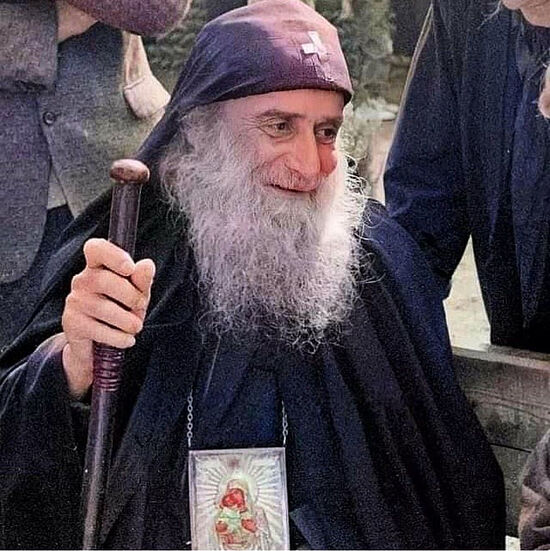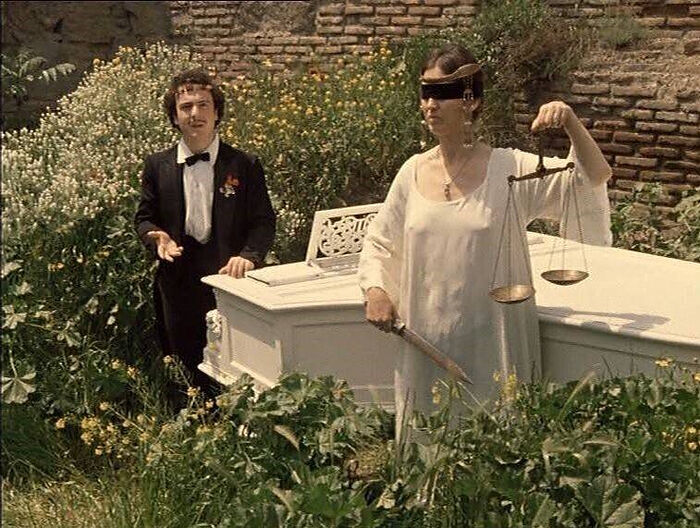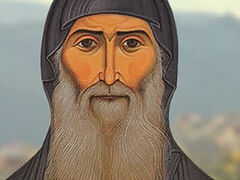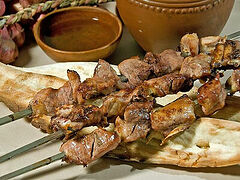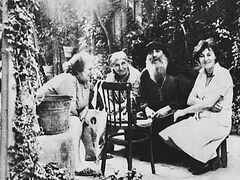Why do modern people love St. Gabriel of Samtavro so much? I think there are two main reasons: First, Elder Gabriel is very close to us—many people still remember the times in which he lived, having reposed only in 1995. And he showed with his life that holiness isn’t somewhere far away, or once upon a time, but here and now, if we are truly with God, living according to faith. And second, because he showed the world the true love that we all sorely lack.
An evening entitled, “The Main Thing Is Faith and Love” was held at the House of the Russian Diaspora in Moscow on November 2, on the feast of St. Gabriel. The hall wasn’t big enough to accommodate everyone who came. The festive program included a screening of Constantine Tsertsvadze’s film I’m Waiting For You in Samtavro, presentations by the rector of the Georgian representation church in Moscow Archpriest Theodore Krechetov and the rector of the Church of Sts. Peter and Paul in the Yaseneovo section of Moscow Archimandrite Melchisedek (Artiukhin), actor David Giorgobiani’s personal memories of the saint, and Georgian chants. The event was organized by the Archangel Michael Fund, which is building the first church in honor of St. Gabriel of Samtavro in the central part of Russia.1
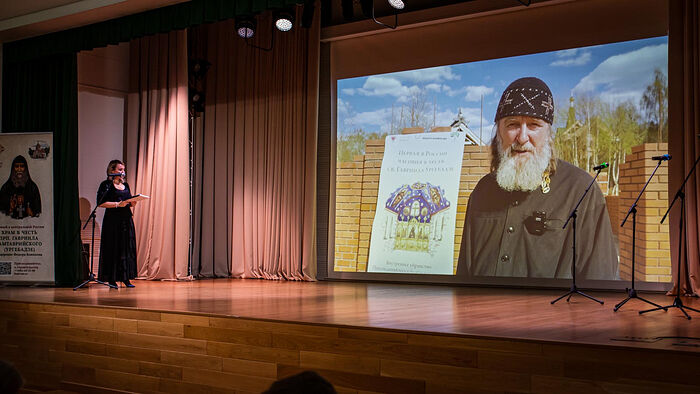 Evening in memory of St. Gabriel of Samtavro
Evening in memory of St. Gabriel of Samtavro
We spoke with David Giorgobiani, a Georgian actor and documentary filmmaker. He is known to many for the film Repentance that became a watershed conversation about faith for its time upon its release in 1986. In the film, David played a talented artist who was executed for trying to defend an ancient church from destruction. After shooting the movie, he left the film industry. And soon the Lord sent him a wondrous meeting with St. Gabriel.
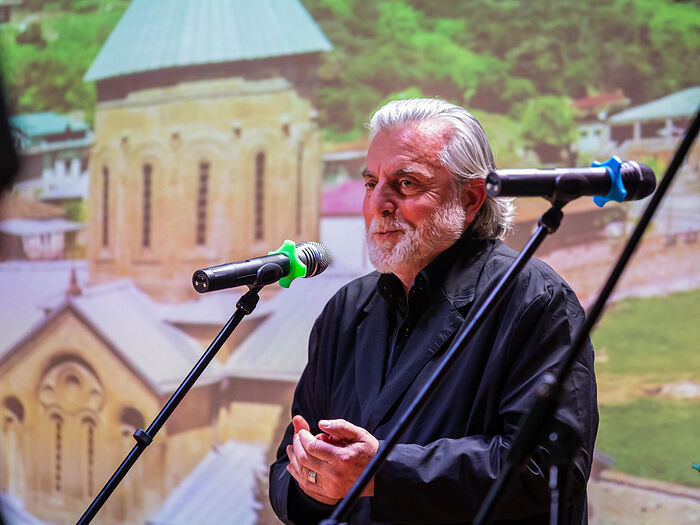 David Giorgobiani at the St. Gabriel memorial evening
David Giorgobiani at the St. Gabriel memorial evening
—I left the film industry after we finished shooting Repentance. I left because I realized I still had a lot to learn about the spiritual life. I wanted to understand why Orthodox people live in poverty, why they don’t live as well as they could. I started traveling to churches and monasteries in search of an answer. And I met Fr. Gabriel. I saw a rather unusual man, unlike anyone I’d ever met in life or on the stage.
—Where did you first meet the Elder? How was he living at that time?
—We met in the yard at his house. It was 1987; Fr. Gabriel wasn’t serving in Samtavro Monastery yet. He was living in a private house, or rather, in the church he built next to his house with his own hands. There was a room with a pit five feet deep—like a grave—where he would sleep. Fr. Gabriel seriously exhausted himself with his ascetic living. No one knew when he ate.
Sometimes, when he was acting as a fool for Christ, he would supposedly drink wine—but it wasn’t wine, but some kind of juice. He did it so people would revile him.
That day when we first met, Fr. Gabriel gave me a big book with Old Georgian prayers. It had prayers for exorcizing demons, which many priests didn’t even read. But we were neophytes, very zealous. You couldn’t even buy the Gospel in Georgia then. And we started printing and distributing these prayers and taking this book to ruined churches to drive out the demons who could settle in abandoned places where there had been some blasphemy—the destruction of a holy place. But of course, it wasn’t us casting out the demons—St. Gabriel blessed us for this, and the exorcisms were accomplished by his prayers. Later, churches really were restored on these sites.
We also read these prayers at one of the spots where we filmed Repentance, near the Narikala Fortress,2 where there was a white piano in the film, because there used to be a church there in ancient times—and a few years later, they built a church on that spot. So the work of rebuilding churches has been very dear to me since those times, and therefore, the work of your foundation, helping churches, is very dear to me.
—What did St. Gabriel mean to you?
—Fr. Gabriel showed us another world, he showed us Christ—living and active. He healed people with his word, with his prayer. I wanted to be with him, to listen to him, to see how people change: They would come as unbelievers and leave as believers. Leaving the “fairytale” world of theater and cinema, I entered a world even more amazing! Fr. Gabriel poured out love and wisdom on people and gave them hope. And most importantly, we ourselves were changing, and we felt it. We thought the Apostles must have experienced basically the same thing when they were with Christ.
But when we’d start extolling the Elder as a saint, he’d start acting foolish. When he preached, or acted foolishly, or healed someone, we felt that God was with him, that Christ isn’t in the distant past, but here with us. We understood that the Lord hadn’t abandoned mankind, as He promised before His Ascension. I’ve never seen anyone even remotely like Fr. Gabriel. We should talk about it, at least for the sake of strengthening the Russian-Georgian friendship, which is suffering today because of unscrupulous politicians.
—Did you ever believe the Elder’s foolishness, or doubt his sanity and righteousness?
—That happened too, and I directly asked him about it once. It was like this: I was leaving church, and Fr. Gabriel was standing there, slightly bent over, with a large icon hanging on his chest, some kind of funny hat on his head, and a deep, grace-filled, and very sorrowful look on his face. I asked him: “Fr. Gabriel, tell me, people say so many bad things about you, but I can’t believe it when I see your eyes! It’s impossible that someone with such eyes could be like what they say about you! Tell me privately, are you perhaps a fool for Christ? I won’t tell anyone.” And he looked at me and nodded.
 Scene from Repentance, with David Giorgobiani in the role of an artist
Scene from Repentance, with David Giorgobiani in the role of an artist
—How did St. Gabriel feel about your work as an actor?
—When he’d see me, he’d often exclaim: “Oh! Repentance!” Some people think that acting is a sinful profession, but Fr. Gabriel would say: “Don’t say that! The Lord gives an actor his talent. The question is how a man uses his talent: to glorify Christ and bring people the truth, or in a completely different way.” The same applies to artists and all creative professions. St. Gabriel really loved the opera. He went to the opera Daisi several times.3 One of the characters in it is the Patriarch, and one time the actor playing the Patriarch messed up. Fr. Gabriel shouted from the audience: “Your Holiness, you messed up. You weren’t supposed to say that.” The show stopped, and he got up on the stage and started preaching Christ. This was back in Soviet times.
—Did you witness any of St. Gabriel’s miracles?
—More than once. One day I brought a possessed woman to see Father. He would heal in different ways. He could denounce, shout—but he shouted at the demon, not the person. Fr. Gabriel didn’t do like other priests who read long prayers from the rite of exorcism—he didn’t need that. He exorcized evil spirits with but a word, like the Apostles. When the demoniac entered his cell, he was already healing her. The woman entered his cell totally at a loss. She was afraid Elder Gabriel would shout at her. And I was worried that being in her terrible state, she might respond in kind, and I pleaded: “Lord, let him heal her some other way!” Fr. Gabriel looked at me and said: “How kind you are!” He read my thoughts and changed his approach. The Elder opened his arms wide and said: “The Holy Spirit is here now! I implored the Lord, and He has forgiven your sins, but stop doing what you’ve been doing.” And the woman was healed. She became joyful, a completely different person. Things like that happened quite often. Fr. Gabriel drove demons out of people and gave them grace to live in God’s way and to cope with their problems.
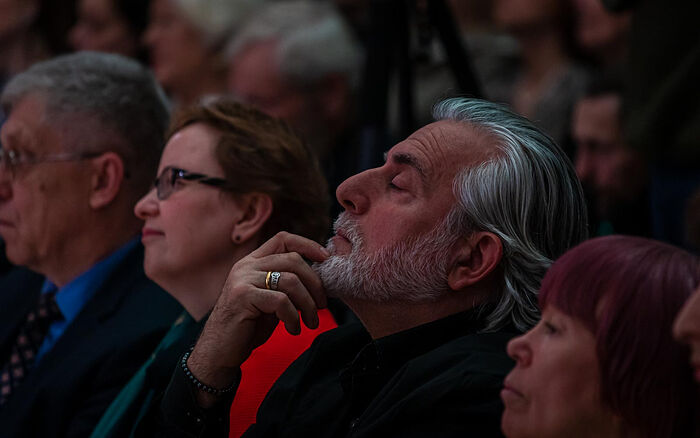 At the memorial evening for St. Gabriel
At the memorial evening for St. Gabriel
—In this case, two miracles were combined: healing and clairvoyance.
—St. Gabriel saw the hearts of men. Once we were sitting by the tower in Samtavro Monastery, where he lived, and he said something as though addressing me, but I didn’t understand how it could have related to me. Then suddenly I heard one of the Elder’s guests weeping—it turns out it was said for that person, who had been waiting for these words all his life. And he heard them the first time he came to see Fr. Gabriel.
By the way, he foretold the future ministry of many priests and bishops, when they were still just regular guys.
—What’s the most important thing that St. Gabriel taught you?
—For us modern people, these words from him are very important: “Preserve love and you’ll be saved.” He gave us these words as a formula for salvation. The Elder stood before God every second. He taught people by deed. For example, a beggar came to him. He gave him something, and then when the man left, he told us: “Do you understand that that was Christ?” St. Gabriel wanted us all to become deep believers and benefit society and our country, each in his own place: in the arts, in sports, or in manufacturing. If you bake bread—bake honestly, without skimping on any ingredients. Do everything as before God.
He would say that those who preserve love will be saved, that love is most important, and he himself set an example of such love. He didn’t allow anyone to denounce the Patriarch or priests. But he himself, when acting foolish, denounced everyone. And when we asked him why he could denounce someone but we couldn’t, he said: “My knees are worn out from praying for them! Do you reprove out of love?”
Fr. Gabriel very strongly warned us against condemnation. Firstly, because condemnation is against love: You judge someone instead of pitying him and praying for him. And secondly, Father reminded us that because of condemnation, the Lord may allow you to fall into the same sin for which you judge another, and which you find repugnant. It’s very scary. For example, you look at LGBT with horror, but if you hate the person, if you condemn him, then the Lord may allow you to become the same. You can condemn sin, call for a legislative restriction on depravity, but don’t despise people.
—It’s easy to love a righteous man, but probably only a righteous man can truly love an inveterate sinner…
—One woman said: “Fr. Gabriel, how I love you!” And he replied: “It’s easy to love me, but try to love others like you love me!” St. Gabriel loved everyone. He would say that no one can bring a heretic or sectarian to Christ but through great love for him—and then only if the Lord so desires and helps. One of the Elder’s spiritual sons hated the Jehovah’s Witnesses, and the Elder said to him: “What a pity that not a single Jehovah’s Witness comes to me! I would sit him down, feed him…” But if you argue, you won’t convert anyone to Orthodoxy; you’ll just make things worse. Although, of course, you have to have the knowledge to defend your faith.
—Did the Elder tell you about his life?
—One day he said to me: “David, my son, if you knew how I was tortured in prison… I nearly died.” But he usually talked about it humorously, so it seemed like he had a good time in prison and the mental hospital. He also said something that amazed me: “I’ve never met a bad person in my life.” Can you imagine? How they beat him! How they slandered him! How they blasphemed! They broke his bones in prison; they tortured him in the madhouse.
—Did he talk about miracles?
—Fr. Gabriel told me about a terrible apparition of the Mother of God that was given to him, and he said: “Wherever you go, tell people about it.” There was a period where he prayed to the Most Holy Theotokos to multiply the Georgian people. Then one day he saw himself in some dark room where there were many bloody, murdered babies. There was blood everywhere. Then the Mother of God suddenly appeared and fearfully asked him: “Is this the kind of multiplication of the Georgian people you’re asking for? I’ll multiply them, and they’ll kill them?!” Fr. Gabriel was terrified. After that, he walked barefoot along Rustaveli Avenue shouting: “Mothers! Save Georgia! Don’t let them kill the children!”
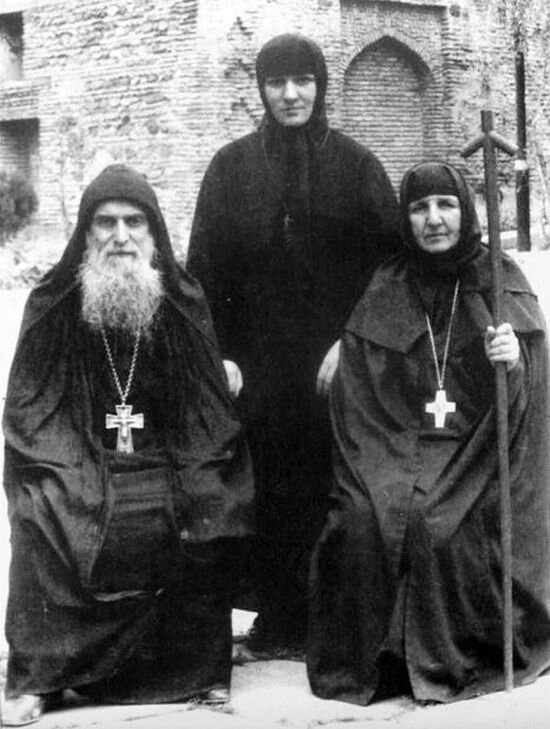 St. Gabriel with the sisters of Samtavro Monastery
St. Gabriel with the sisters of Samtavro Monastery
—How did the Elder instruct the nuns while living at Samtavro?
—Unusually, like everything he did. For example, once the sisters started giving in to the thought: Is it really so important to fast on Monday, as is customary for monastics? It’s understandable: On Wednesday, Judas betrayed Christ, and on Friday the Lord was crucified—but why fast on Mondays? Fr. Gabriel saw this thought but didn’t rebuke them. Instead, he himself expressed these thoughts out loud and said he blessed them not to fast on Monday. The sisters were delighted and ate what they wanted. Wednesday came. Fr. Gabriel went to them and said: “Why should we fast on Wednesday? I understand Fridays, I get the four fasts, but who came up with this Wednesday? Have dairy! I bless you!” “After all, obedience is higher than fasting and prayer; we have to obey!” And the nuns obeyed and skipped the fast on Wednesday, only this time not with joy, but with tears. And when Fr. Gabriel came to them on Friday with the same look on his face, they all flew away like doves so as not to hear what he would say! They understood everything and fasted as they should from then on.
—St. Gabriel often shouted at people. Did you find it disturbing?
—Once he was asked: “Are you really angry at us when you shout at us?” And he responded: “No, I don’t have it in me.” And we knew it.
Once, some well-read people started speaking out against faith in the Holy Fire, and some of us started listening to them and started doubting. Then the Elder showed us a burning lamp and said with great love and reverence: “This is the Holy Fire burning here. It was brought to me from Jerusalem. Anoint yourself with oil from this lampada. Only, I don’t have a brush.” One of us reached out his hand, dipped his pointer finger in the oil, and anointed himself. And Fr. Gabriel shouted: “What have you done?! How dare you shove that finger in this holy lampada?!” We were frightened; we didn’t understand: First he himself blessed, and now he’s shouting…. And the Elder said to me: “You anoint yourself.” What could I do? I looked at my hand in fright: It’s not allowed with my pointer finger, so how? I carefully dipped my pinky into the lampada… “Now that’s how you should anoint yourself with oil!” Fr. Gabriel exclaimed. Ever since, they anoint with their pinkies in Samtavro—it’s more humble, more reverent.
—Humility was one of Fr. Gabriel’s main qualities.
—Yes. And sometimes it was wondrously combined with miracles. For example, he foretold: “Until they glorify my spiritual fathers as saints, they won’t glorify me either.” His spiritual fathers, Venerable John (Maisuradze) and Venerable George-John (Mkheidze), labored in asceticism at Betania Monastery. He buried them and foretold that that their bodies would remain incorrupt. But his words were forgotten. Then one day a friend from the Georgian Patriarchate called me and said: “David, you know a lot about Fr. Gabriel. Perhaps you can explain why we can’t seem to uncover his relics?” I reminded him of what the Elder had said. What was it in his words? Humility, the desire not to allow himself to be placed above his spiritual fathers. And indeed, after the Betania fathers were glorified, they were able to canonize Fr. Gabriel as well.
He humbled himself very much, saying he was like a dog before the Lord. Even the obvious miracles that happened with him he didn’t attribute to himself. For example, when he was building his church and had no one to help him, the buckets of cement moved all by themselves. He was caught in the act—people witnessed this miracle. And Fr. Gabriel would sincerely say: “What’s it have to do with me? There was no one to help, and the Lord sent an angel!” Although it was clear to us that the Lord sent him an angel because he was worthy of it. But sometimes, when he was being foolish, he made himself look proud, so people would condemn him.

